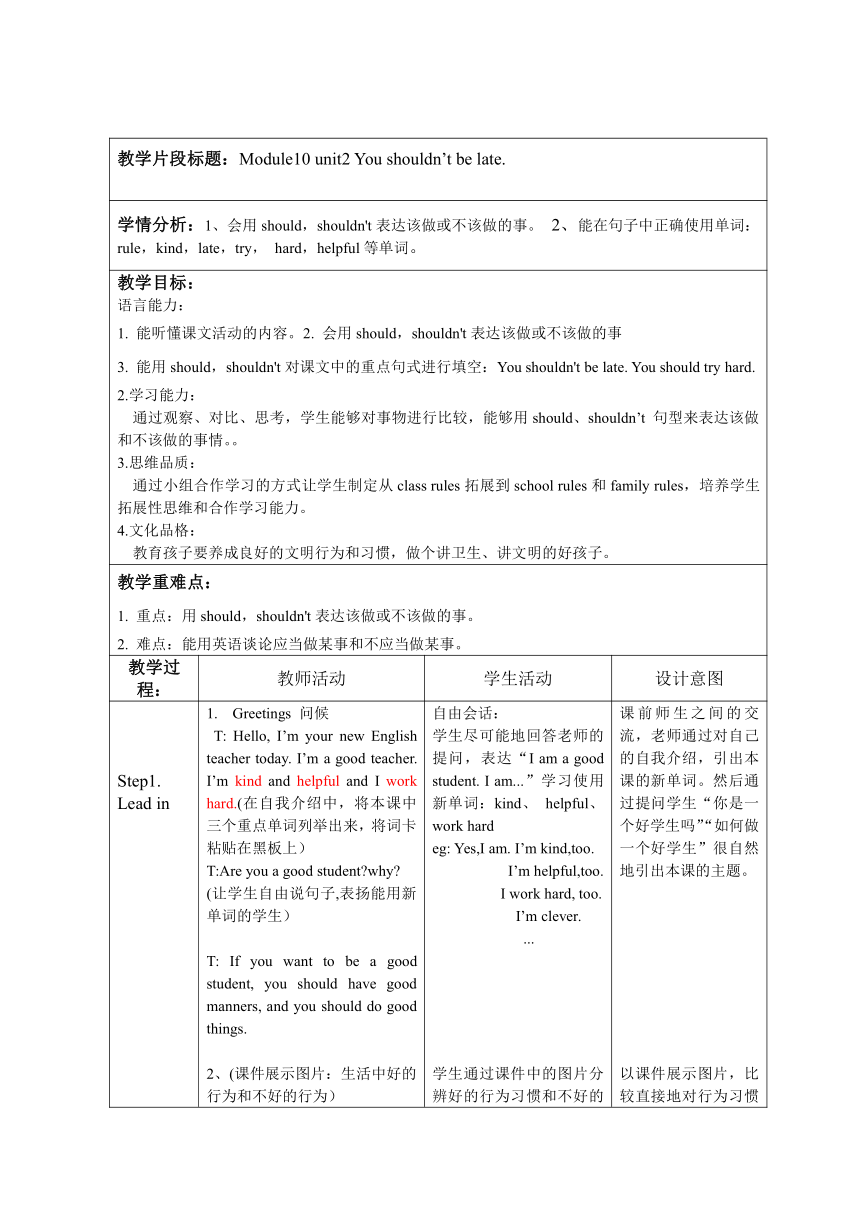外研版(一起)五上 Module 10 Unit 2 You shouldn’t be late教案(表格式)
文档属性
| 名称 | 外研版(一起)五上 Module 10 Unit 2 You shouldn’t be late教案(表格式) |

|
|
| 格式 | docx | ||
| 文件大小 | 20.5KB | ||
| 资源类型 | 教案 | ||
| 版本资源 | 外研版(一年级起点) | ||
| 科目 | 英语 | ||
| 更新时间 | 2021-09-06 10:48:10 | ||
图片预览

文档简介
教学片段标题:Module10
unit2
You
shouldn’t
be
late.
学情分析:1、会用should,shouldn't表达该做或不该做的事。
2、能在句子中正确使用单词:rule,kind,late,try,
hard,helpful等单词。
教学目标:
语言能力:
1.
能听懂课文活动的内容。2.
会用should,shouldn't表达该做或不该做的事
3.
能用should,shouldn't对课文中的重点句式进行填空:You
shouldn't
be
late.
You
should
try
hard.
2.学习能力:
通过观察、对比、思考,学生能够对事物进行比较,能够用should、shouldn’t
句型来表达该做和不该做的事情。。
3.思维品质:
通过小组合作学习的方式让学生制定从class
rules拓展到school
rules和family
rules,培养学生拓展性思维和合作学习能力。
4.文化品格:
教育孩子要养成良好的文明行为和习惯,做个讲卫生、讲文明的好孩子。
教学重难点:
1.
重点:用should,shouldn't表达该做或不该做的事。
2.
难点:能用英语谈论应当做某事和不应当做某事。
教学过程:
教师活动
学生活动
设计意图
Step1.
Lead
in
Greetings
问候
T:
Hello,
I’m
your
new
English
teacher
today.
I’m
a
good
teacher.
I’m
kind
and
helpful
and
I
work
hard.(在自我介绍中,将本课中三个重点单词列举出来,将词卡粘贴在黑板上)
T:Are
you
a
good
student?why?
(让学生自由说句子,表扬能用新单词的学生)
T:
If
you
want
to
be
a
good
student,
you
should
have
good
manners,
and
you
should
do
good
things.
2、(课件展示图片:生活中好的行为和不好的行为)
T:Let’s
see
what
are
the
good
manners
in
our
life.
What
should
we
do
or
shouln’t
do
?
(看图片说句子:老师将should
和shouldn’t单词板书在黑板上,引导学生用这两个词说句子。)
(老师出示事先准备的动词词组词条,让学生上台抽取纸条并用should或shouldn’t说句子,并归类到should和shouldn’t
的分组里)
Shouldn’t
should
make
a
mess
listen
in
class
play
with
CDs
wash
face
often
eat
fruits
often
eat
vegetables
often
play
computer
games
often
usually
watch
TV
…
自由会话:
学生尽可能地回答老师的提问,表达“I
am
a
good
student.
I
am...”学习使用新单词:kind、
helpful、work
hard
eg:
Yes,I
am.
I’m
kind,too.
I’m
helpful,too.
I
work
hard,
too.
I’m
clever.
...
学生通过课件中的图片分辨好的行为习惯和不好的行为习惯,用should或shouldn’t
造句。
可采取独立回答问题的方式,也可进行小组之间的抢答比赛。
谈论好的习惯和不好的习惯。老师给出学生一些短语的同时,也可以让学生以小组合作的形式讨论,最后让学生上台说出的句子。并把他们归纳到正确的行列。
课前师生之间的交流,老师通过对自己的自我介绍,引出本课的新单词。然后通过提问学生“你是一个好学生吗”“如何做一个好学生”很自然地引出本课的主题。
以课件展示图片,比较直接地对行为习惯的好坏进行辨别,复习should和shouldn’t句型。
对上节课所学的重点句型和动词词组进行复习。大量的动词词组扩展学生的思维,也是对后面的拓展环节提供需要的词组积累。
Step2.
Consolidation
1、(播放一段老师在课前录制的一段学生上课的视频和课间活动的视频
)
T:
How
to
be
a
good
student?
What
should
you
do
or
shouldn’t
do?
(通过视频切换情境,说句子)
eg.
You
should
talk
in
class.
You
shouldn’t
be
late.
...
学习新单词:work
hard
kind
helpful
(将孩子们说出来的句子一一列举在黑板上,并写上标题
Class
rules
听读课文。
让学生跟着课件朗读Miss
Smart’s
class
rules.
T:What
are
Miss
Smart’s
class
rules?
让学生复述课文。
3、主题设计学习
Topics:
School
rules
Family
rules
为了让孩子们能明确生活中的规则,老师可以给予一些动词短语示范,让学生想更多的句子??
eg:
do
exercise
lazy
get
up
early
get
to
bed
lately
eat
too
much
do
homework
tidy
your
room
walk
on
the
grass
take
food
to
school
wash
hands
before
dinner
...
Homework
Finish
family
rules
or
school
rules
让学生对视频的场景进行描述,并用should和shouldn’t进行说明。由此引出新单词:kind、helpful、work
hard,class
rules.
将句子一一列举在黑板上,并写上Class
rules,完成板书。
学生听读课文、熟记句子,复述课文内容。
以小组合作活动,各小组可以在两个主题中任选一个,制作一个“文明行为准则”,并将rules写在图卡上
做出来的图卡将由小组全体成员上台进行展示和宣读。
完成作业
将孩子们最真实的生活场景拍成视频,并引导他们分辨好的行为习惯和不好的行为习惯。并直观的引出本课的重点单词和句型。
此环节完成对文本的学习和巩固,让孩子们熟练地掌握课本内容。
通过完成图卡这一活动使英语变得生活化,让学生在生活中多使用英语,培养学生养成良好的生活习惯和行为习惯。
板书设计
Module10
Unit
2
You
shouldn’t
be
late
Class
Rules
You
shouldn’t
be
late
You
should
bring
your
books
to
class
You
should
listen
in
class
You
should
work
hard
You
should
be
kind
You
should
be
helpful
unit2
You
shouldn’t
be
late.
学情分析:1、会用should,shouldn't表达该做或不该做的事。
2、能在句子中正确使用单词:rule,kind,late,try,
hard,helpful等单词。
教学目标:
语言能力:
1.
能听懂课文活动的内容。2.
会用should,shouldn't表达该做或不该做的事
3.
能用should,shouldn't对课文中的重点句式进行填空:You
shouldn't
be
late.
You
should
try
hard.
2.学习能力:
通过观察、对比、思考,学生能够对事物进行比较,能够用should、shouldn’t
句型来表达该做和不该做的事情。。
3.思维品质:
通过小组合作学习的方式让学生制定从class
rules拓展到school
rules和family
rules,培养学生拓展性思维和合作学习能力。
4.文化品格:
教育孩子要养成良好的文明行为和习惯,做个讲卫生、讲文明的好孩子。
教学重难点:
1.
重点:用should,shouldn't表达该做或不该做的事。
2.
难点:能用英语谈论应当做某事和不应当做某事。
教学过程:
教师活动
学生活动
设计意图
Step1.
Lead
in
Greetings
问候
T:
Hello,
I’m
your
new
English
teacher
today.
I’m
a
good
teacher.
I’m
kind
and
helpful
and
I
work
hard.(在自我介绍中,将本课中三个重点单词列举出来,将词卡粘贴在黑板上)
T:Are
you
a
good
student?why?
(让学生自由说句子,表扬能用新单词的学生)
T:
If
you
want
to
be
a
good
student,
you
should
have
good
manners,
and
you
should
do
good
things.
2、(课件展示图片:生活中好的行为和不好的行为)
T:Let’s
see
what
are
the
good
manners
in
our
life.
What
should
we
do
or
shouln’t
do
?
(看图片说句子:老师将should
和shouldn’t单词板书在黑板上,引导学生用这两个词说句子。)
(老师出示事先准备的动词词组词条,让学生上台抽取纸条并用should或shouldn’t说句子,并归类到should和shouldn’t
的分组里)
Shouldn’t
should
make
a
mess
listen
in
class
play
with
CDs
wash
face
often
eat
fruits
often
eat
vegetables
often
play
computer
games
often
usually
watch
TV
…
自由会话:
学生尽可能地回答老师的提问,表达“I
am
a
good
student.
I
am...”学习使用新单词:kind、
helpful、work
hard
eg:
Yes,I
am.
I’m
kind,too.
I’m
helpful,too.
I
work
hard,
too.
I’m
clever.
...
学生通过课件中的图片分辨好的行为习惯和不好的行为习惯,用should或shouldn’t
造句。
可采取独立回答问题的方式,也可进行小组之间的抢答比赛。
谈论好的习惯和不好的习惯。老师给出学生一些短语的同时,也可以让学生以小组合作的形式讨论,最后让学生上台说出的句子。并把他们归纳到正确的行列。
课前师生之间的交流,老师通过对自己的自我介绍,引出本课的新单词。然后通过提问学生“你是一个好学生吗”“如何做一个好学生”很自然地引出本课的主题。
以课件展示图片,比较直接地对行为习惯的好坏进行辨别,复习should和shouldn’t句型。
对上节课所学的重点句型和动词词组进行复习。大量的动词词组扩展学生的思维,也是对后面的拓展环节提供需要的词组积累。
Step2.
Consolidation
1、(播放一段老师在课前录制的一段学生上课的视频和课间活动的视频
)
T:
How
to
be
a
good
student?
What
should
you
do
or
shouldn’t
do?
(通过视频切换情境,说句子)
eg.
You
should
talk
in
class.
You
shouldn’t
be
late.
...
学习新单词:work
hard
kind
helpful
(将孩子们说出来的句子一一列举在黑板上,并写上标题
Class
rules
听读课文。
让学生跟着课件朗读Miss
Smart’s
class
rules.
T:What
are
Miss
Smart’s
class
rules?
让学生复述课文。
3、主题设计学习
Topics:
School
rules
Family
rules
为了让孩子们能明确生活中的规则,老师可以给予一些动词短语示范,让学生想更多的句子??
eg:
do
exercise
lazy
get
up
early
get
to
bed
lately
eat
too
much
do
homework
tidy
your
room
walk
on
the
grass
take
food
to
school
wash
hands
before
dinner
...
Homework
Finish
family
rules
or
school
rules
让学生对视频的场景进行描述,并用should和shouldn’t进行说明。由此引出新单词:kind、helpful、work
hard,class
rules.
将句子一一列举在黑板上,并写上Class
rules,完成板书。
学生听读课文、熟记句子,复述课文内容。
以小组合作活动,各小组可以在两个主题中任选一个,制作一个“文明行为准则”,并将rules写在图卡上
做出来的图卡将由小组全体成员上台进行展示和宣读。
完成作业
将孩子们最真实的生活场景拍成视频,并引导他们分辨好的行为习惯和不好的行为习惯。并直观的引出本课的重点单词和句型。
此环节完成对文本的学习和巩固,让孩子们熟练地掌握课本内容。
通过完成图卡这一活动使英语变得生活化,让学生在生活中多使用英语,培养学生养成良好的生活习惯和行为习惯。
板书设计
Module10
Unit
2
You
shouldn’t
be
late
Class
Rules
You
shouldn’t
be
late
You
should
bring
your
books
to
class
You
should
listen
in
class
You
should
work
hard
You
should
be
kind
You
should
be
helpful
同课章节目录
- Module 1
- Unit 1 There wasn't a clock here before.
- Unit 2 There are tall trees now.
- Module 2
- Unit 1 This one is heavy.
- Unit 2 They sell different things.
- Module 3
- Unit 1 Today is Halloween
- Unit 2 Easter is in Spring in the UK.
- Module 4
- Unit 1 We're going to tell stories.
- Unit 2 I'm going to be eleven.
- Module 5
- Unit 1 It's mine.
- Unit 2 Amy's blue dress is wet.
- Module 6
- Unit 1 You can play basketball well.
- Unit 2 They got seventy points.
- Module 7
- Unit 1 This dog can help him
- Unit 2 It could find the people .
- Module 8
- Unit 1 Children often sit around tables.
- Unit 2 There are lots of games.
- Module 9
- Unit 1 Are you sad?
- Unit 2 She was very happy.
- Module 10
- Unit 1 You should tidy your toys.
- Unit 2 You shouldn't be late.
- Review Module
- Unit 1
- Unit 2
